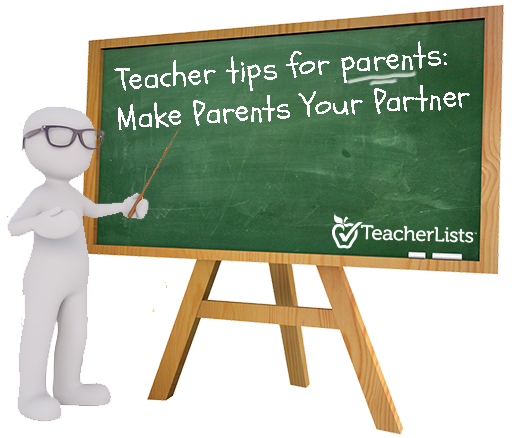Make Parents Your Partner: Teacher Tips for Parents

Teachers: Make Parents Your Partner
Building strong relationships with your students’ parents takes time, but it’s an investment sure to pay off. When parents and teachers work together as partners, kids benefit greatly.
A solid parent-teacher partnership hinges on mutual respect and open communication. Ideally, you both should be accessible to each other—when one of you gets a call, email, or meeting request from the other, it’s helpful to respond quickly. When a student is struggling, work together to come up with a solution. Then, do your best to follow through with what you discussed.
Working in partnership doesn’t mean you’ll always agree on everything. But when you have different ideas for what’s best for a student, a strong relationship with her parent will give everyone the best chance at a good outcome.

Below are some tips on ways to make parents your partners.
Make Yourself Available
Set aside specific hours throughout the day when parents can contact you with concerns. Make sure to give them a variety of ways to reach you—email, text, phone, etc. Stick to the hours you set for communication, and avoid responding to 5 a.m. texts or 11 p.m. phone calls—you don’t want to set a precedent that you’re always available.
As well, it’s completely OK to let parents know your preferred communication method. If you prefer texts or emails, be sure to convey that. Many teachers opt for these less-intrusive methods, reserving phone conversations or in-person meetings for more serious issues.
Find Creative Ways To Foster Communication
Keep parents informed of what is going on in their child’s life at school by making a weekly newsletter or creating a classroom website. There are also plenty of apps to help you streamline your communication options with parents—go that extra step to ensure that they are well-informed of their child’s education. Contact parents regularly for good news, as well as bad. Parents need positive reinforcement, too!
Provide a Different Perspective
Teachers can help parents understand their child from a different perspective. They know things about curriculum and child development that parents might not. What a teacher sees at school might be different from what the parent sees at home. Teachers should share their observations about a student’s interaction with his peers, his attention levels in class, and if he seems distant or distracted.
Encourage Parents To Share
When changes happen at home, it’s important for parents to inform their teachers. Even subtle changes in a home environment can affect kids in class. It could be a change in a child’s ADHD medication, a death in the family, or a change in work schedules that alter after-school and evening routines. Some parents will find it difficult to share personal family information, but it helps to remind them that you need to be aware of such changes to help monitor any behavioral changes.
Help Homework Motivation
When parents and teachers communicate efficiently, the benefits to students reach beyond the classroom. Parents who understand their kids’ curriculum challenges can set aside time to work directly with them on homework assignments before students become frustrated. Advise parents to have their child complete assignments she is comfortable with first, and then sit with her to work on the tough subjects together. Our article called “Homework Tips for Parents” is a handy guide to help parents and students maximize their homework efforts.
Step Up to the Plate With Bad News
Nobody likes to give or receive bad news. When it concerns a student, it’s human nature for teachers to be hesitant, especially if you don’t know what reactions to expect from the parent. But remember that open communication with parents during the “good times” will make these discussions easier to get through. Parents will be less likely to push back on your assessment and recommendations if you’ve kept an open, respectful rapport together. When parents see your relationship as a partnership, they’ll be more inclined to want to work with you, rather than feel you’re dictating problems to them.
The key to successful parent-teacher collaboration is to become a team, working together to benefit students. This collaboration is a powerful tool in helping a child be successful in the classroom—and it starts simply by valuing, and supporting, what the other brings to the table.
Teachers: Use these tips as a guide in developing a communication plan with parents, or download this PDF version to share directly with your new parent partners.



